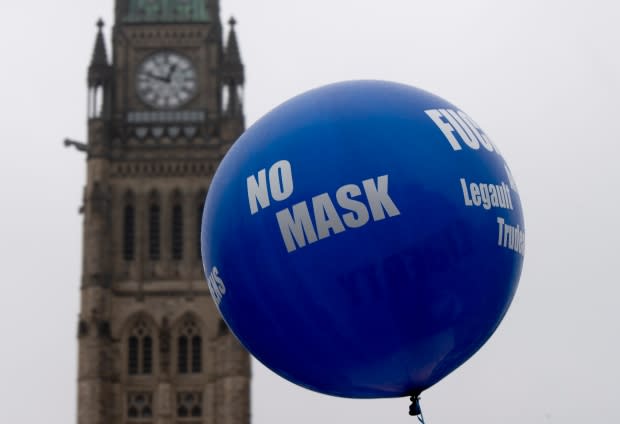Global rally against COVID-19 safety measures comes to Parliament Hill
Flouting public health guidance to wear masks in public areas, avoid large gatherings and practise physical distancing, hundreds of demonstrators gathered on Parliament Hill Saturday to protest pandemic safety measures they say infringe on their personal rights.
The group behind the rally is part of a wider movement of people across the globe venting their frustrations over science-backed measures designed to slow the spread of COVID-19. The majority of protesters did not wear masks and congregated closely together on Parliament Hill's front lawn.
The demonstration was one of several rallies that took place around the world on Saturday. In Berlin, 38,000 people protested public safety restrictions at an event that was disbanded by police after demonstrators failed to keep their distance and wear masks as instructed.
Elsewhere in Europe, about 200 anti-mask activists held a similar rally in Paris, while thousands of demonstrators gathered in London's Trafalgar Square calling the coronavirus a hoax and demanding an end to restrictions.
The group behind the event in Canada's capital calls itself a "leaderless" movement that doesn't take political sides, and says it is mostly concerned with being forced to comply with the measures.
"We are not anti-mask at all, we are pro-liberty," said Kelly Anne Wolfe, the executive director of The Line Canada, a group that organized the protest. "If you want to wear a mask or a tutu, we have nothing to say about that. That is your right. You do not have a right to put one on my face or the face of my children. It's as simple as that."
The Parliamentary Protective Service, which is responsible for security on Parliament Hill, did not initially issue an estimate of the size of Saturday's crowd. On Tuesday afternoon, the PPS told CBC News that an estimated 1,200 people attended the rally "at its peak."
Masks protect individuals — and others
Public health authorities have overwhelmingly recommended or mandated the use of masks to protect against transmission and exposure of the virus — particularly in cases where a person is asymptomatic or might not know if they have been infected.
The Public Health Agency of Canada recommends wearing a homemade or non-medical mask when it is not possible to maintain physical distancing, while many jurisdictions across the country have also made mask-wearing mandatory in indoor public areas.

"It's been shown to be a very effective public health measure," said Craig Jenne, an infectious disease researcher at the University of Alberta. "We know, for example, that masks can reduce the transmission and spread of droplets by more than six-fold."
Jenne said that when it comes to considering personal freedom, context is important.
"Wearing a mask is not a large ask and [it] is not an arduous process to literally protect the lives of people in your community."
While some individuals are not able to wear masks because of pre-existing health conditions, those who can are helping to stop the spread, he added.
"If we can do our part to keep viral numbers down, we can protect them as well. So it really is just an overall community effort."
Beliefs shared widely online
The group responsible for Saturday's rally mobilized on Facebook, where organizers said they expected 200,000 people to show up.
Only a small fraction of that number materialized, but experts say these beliefs have found new life online.
"I have noticed an increased level of misinformation circulating on social media since the beginning of the pandemic," said Aengus Bridgman, a Montreal-based researcher with the Media Ecosystem Observatory.

While social media provides a platform for citizens to exercise fundamental freedoms and participate in the democratic process, Bridgman said that must be weighed against sharing harmful information.
"There are concerns when we have social media platforms that are, through negligence, allowing the spread of misinformation that...leads to increased infection rates, increased deaths, and increases the duration of the pandemic."
Earlier this week, Canada's Chief Public Health Officer Dr. Theresa Tam acknowledged that online platforms were also contributing to mistrust surrounding a COVID-19 vaccine.
"I am also concerned about the first pandemic in the age of the internet and social media. This is an area of significant work because we have an overload of information through which many Canadians can't sort out what is credible and what is not," she said.
"I look towards different partners, different government departments coming together to look at how we better address some of the myths and disinformation that is in that space. That is, I think, fundamentally a massive challenge."


